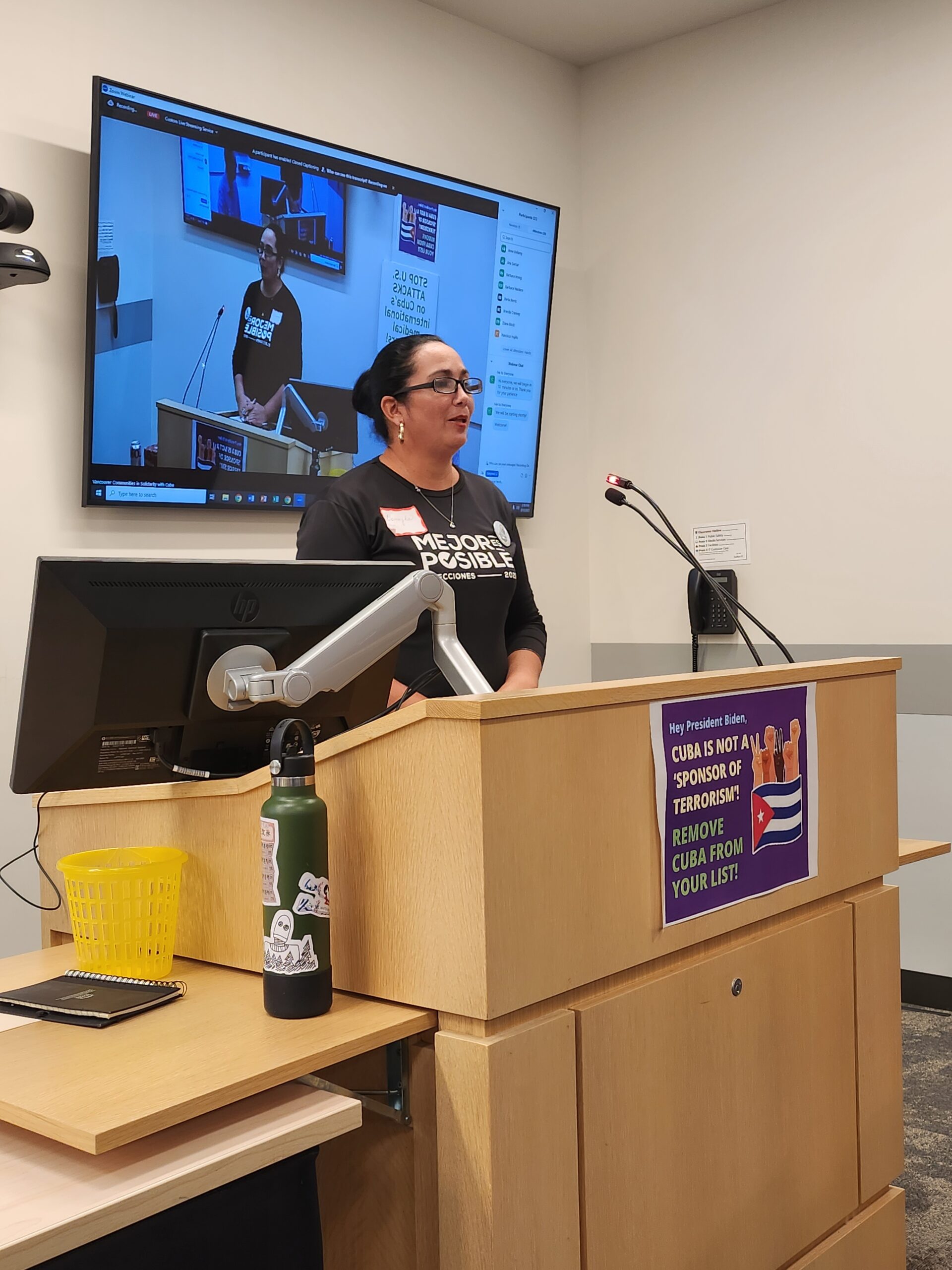

Osmayda Hernandez, FMC Director of International Relations, March 11, 2023. (WW PHOTO: Monica Moorehead)
New York City
An International U.S.-Cuba Normalization Conference took place March 11-12 at the Fordham University School of Law in Manhattan — 200 activists attended the conference in person, while hundreds more, including those from around the world, live streamed the event. The conference was hosted by the New York-New Jersey Cuba Sí Coalition, made up of dozens of organizations.
Osmayda Hernandez, FMC Director of International Relations, March 11, 2023. (WW PHOTO: Monica Moorehead)
The main demands of the conference are to unblock socialist Cuba from the 61-year inhumane U.S. blockade and to demand that President Joe Biden remove Cuba from the U.S. State Department’s “State Sponsors of Terrorism” list. Throughout the conference, activists explained how these anti-communist U.S.-led attacks on Cuba may have stifled the revolutionary socialist process in Cuba but have not stopped that process, including in social, scientific, technology and cultural areas of advancements.
Among the many inspiring highlights of the conference was the participation of the Cubans, who educated the conference on the ongoing revolutionary progress made especially by Cuban women for gender equality.
A keynote address was made by Noemi Rabaza Fernandez, First Vice-President, Cuban Institute of Friendship with the Peoples (ICAP), who commented on the negative impact of sanctions on the Cuban economy. ICAP has helped to organize brigades for many decades from around the world to travel to Cuba to show concrete solidarity with socialist construction.
There was also a delegation from the Federation of Cuban Women (FMC), founded on Aug. 23, 1960, by the late Vilma Espin, a leader of the Cuban Revolution. The FMC has participated for 10 years in activities organized by the United Nations Commission on the Status of Women. There are over 4 million members of the FMC, roughly 95% of the female population over the age of 14.
Osmayda Hernandez, Director of FMC International Relations, spoke on the radical transformation of women’s rights in Cuba, along with rights of sexual identity and sexual orientation. The major goal of the FMC is the defense of the Cuban Revolution.
Hernandez presented statistics that show the impact of women in many sectors of Cuban society. Women make up 53.2% of the National Assembly; 43.2% of the Council of States; 60% of university graduates; 67% of technical and professional workers; 81% of professors, scientists and teachers; and 81% of prosecutors in the provisional courts. Cuban women make up the second highest number of women parliamentarians in the world, and there is parity amongst women and men workers in the state labor force.
A representative of the National Union of Cuban Jurists made remarks about the Family Code, recently passed in September, which broadens the definition of what constitutes a Cuban family and their rights. Known as the “Law of Love,” the Code broadens the rights of not only blood mothers and fathers but also grandparents; aunts, uncles, and lesbians, gays, bisexuals, trans and queer people; the disabled; and more.
In the case of adoption, a person has the right to adopt if they have taken on the responsibility to raise the child, even if an abandoning parent attempts to reclaim the child. To read a summary of the code, go to walterlippmann.com/cuban-families-code-2022-summary/.
Download the PDF May Day appeal to the working class Revolutionary change is urgent! Gaza…
Philadelphia On March 26, the Pennsylvania Supreme Court denied political prisoner Mumia Abu-Jamal permission to…
There are two important and overlapping holidays on April 22: Earth Day and Vladimir Lenin’s…
Twelve people were arrested April 9 for blocking traffic to Travis Air Force Base, a…
Secretary-General of Hezbollah Sheikh Naim Qassem delivered a speech on April 18, 2025. Resistance News…
Anakbayan Philadelphia held a rally on April 19 to demand the U.S. end its military…